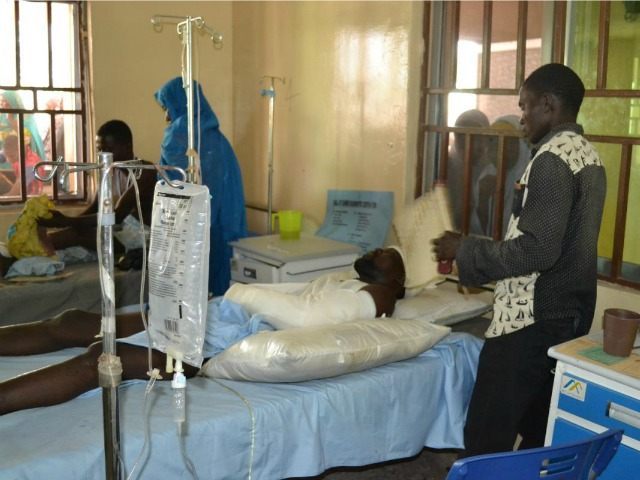Between 40-60 worshippers at a mosque in northeastern Nigeria were killed Friday by a trio of female suicide bombers believed to have been sent by the ISIS-affiliated terror group Boko Haram.
The three girls, whom the BBC reports were believed to be between eleven and fifteen years of age, struck in near-unison on the outskirts of Maiduguri, the capital of northeast Borno state. Their attack follows one that nearly collapsed a mosque in the same city on Friday evening. In the Thursday attack, two men detonated their bombs–the first to kill worshippers inside the mosque, and the second after a crowd had rushed into the mosque to save the victims of the first. The BBC states that at least 32 people died in the combined attacks.
Reports in local Nigerian media, citing sources cleaning up the bomb site on the ground, say “more than 60” may have been killed in the attacks.
“All the people in the mosque died. Not a single one escaped,” an eyewitness told The Telegraph about the Thursday evening bombing.
While Boko Haram, now the African wing of the Islamic State following leader Abubakar Shekau’s pledge of allegiance to “Caliph” Abu Bakr al-Baghdadi, has not taken credit for the attacks, most believe it is the work of the jihadist gang. Speaking to the BBC, the Nigerian military has stuck to its claims that these attacks are not an indication that Boko Haram has the capacity to cause significant damage, but a sign that they are desperate. “They have been degraded to the extent that they can no longer fight collectively,” said military spokesman Sani Kukasheka Usman.
Despite the consistent attacks, Nigerian President Muhammadu Buhari has insisted that the group will no longer exist by December, thanks to the efforts of a coalition of troops from Nigeria, Niger, Cameroon, Benin, and now, the United States. “As soon as the rainy season comes, which is by the end of the year … Boko Haram will virtually be out of their main stronghold and that will be the end of it,” Buhari told Al Jazeera in an interview set to be published Friday. He has vowed not to resign in the event that Boko Haram continues to exist past December 2015.
Boko Haram may be needing more manpower to continue its suicide attacks, however, as indicated by a call this week to fellow jihadists al-Shabaab to help both Boko Haram and the greater Islamic State in waging more terror attacks. The group called for Al-Shabaab to become part of the larger Sunni coalition of terrorist groups. Al-Shabaab, which operates out of Somalia and has staged numerous terrorist attacks in Kenya, has traditionally been affiliated with rival group al-Qaeda, and did not respond to a call from al-Baghdadi earlier in the year to forsake al-Qaeda for ISIS.
While Boko Haram appears to have fewer jihadists and munitions, the Nigerian military is warning that the group has come into the possession of internationally banned cluster bombs, which they do not have the capacity to properly drop from aircraft. The military has warned that abandoned cluster bombs can sometimes operate like landmines and explode on contact, killing those within its reach.
Following the news of Boko Haram’s possession of cluster bombs is a report from an NGO that they may have acquired the bombs through the Nigerian military, from raids on military compounds or corrupt leaders on the inside. While there is no definitive proof of this, the army convicted one of its highest-ranked officers, Brigadier General Enitan Ransome-Kuti, of “cowardly behaviour, loss of weapons to Boko Haram, and negligent performance of military duty” on Thursday, a sign that the military has, in fact, allowed such weapons to come into the hand of Boko Haram terrorists.

COMMENTS
Please let us know if you're having issues with commenting.